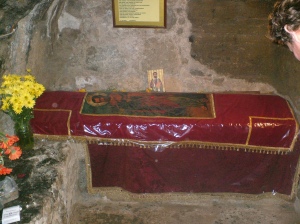Today I give you an extract from Wednesday evening’s talk ‘Ancient Christians of Cyprus’. Enjoy!

Although little is known about Cypriot Christians in the early years of the church, we do know that the apostles Paul and Barnabas visited the island. The book of Acts tells us as follows:
13 1 Now in the church at Antioch there were prophets and teachers: Barnabas, Simeon called Niger, Lucius of Cyrene, Manaen (who had been brought up with Herod the tetrarch) and Saul. 2 While they were worshipping the Lord and fasting, the Holy Spirit said, ‘Set apart for me Barnabas and Saul for the work to which I have called them.’ 3 So after they had fasted and prayed, they placed their hands on them and sent them off.
4 The two of them, sent on their way by the Holy Spirit, went down to Seleucia and sailed from there to Cyprus. 5 When they arrived at Salamis, they proclaimed the word of God in the Jewish synagogues. John was with them as their helper.
6 They travelled through the whole island until they came to Paphos. There they met a Jewish sorcerer and false prophet named Bar-Jesus, 7 who was an attendant of the proconsul, Sergius Paulus. The proconsul, an intelligent man, sent for Barnabas and Saul because he wanted to hear the word of God. 8 But Elymas the sorcerer (for that is what his name means) opposed them and tried to turn the proconsul from the faith. 9 Then Saul, who was also called Paul, filled with the Holy Spirit, looked straight at Elymas and said, 10 ‘You are a child of the devil and an enemy of everything that is right! You are full of all kinds of deceit and trickery. Will you never stop perverting the right ways of the Lord? 11 Now the hand of the Lord is against you. You are going to be blind for a time, not even able to see the light of the sun.’
Immediately mist and darkness came over him, and he groped about, seeking someone to lead him by the hand. 12 When the proconsul saw what had happened, he believed, for was amazed at the teaching about the Lord. (Acts 13:1-12, NIV)
Barnabas, we have already learned earlier in Acts 4, was a Jewish man from Cyprus who was part of the Jerusalem church. His ‘real’ name was Joseph, but his fellow-believers called him Barnabas—‘Son of Encouragement.’ We see him performing his acts of encouragement in Acts 9 when he convinces the apostles that Paul is no longer a persecutor but has become a believer like them.
In Acts 11, he moves from Jerusalem to Antioch at the apostles’ bidding to help out with the church that is growing there as a result of the persecution at Jerusalem. In the same chapter, we also learn that Christians from Jerusalem have moved to Cyprus; so the story above about Paul and Barnabas is not the first time the people of Cyprus have encountered the Gospel. The Lord was making ready the soil for the arrival of his great preachers.
Barnabas accompanies Paul in his many missionary journeys throughout the eastern Mediterranean until they part ways in a dispute over Barnabas’ kinsman Mark, whom Paul does not wish to take with them because of some earlier abandonment of the mission, it seems. From here, Barnabas disappears from historically reliable sources.
Nonetheless, what we are told in the Acts of Barnabas which date to before 478 when his alleged tomb near Salamis was discovered, is not unlikely in terms of broad detail.
I would like to make a brief note about apocryphal acts before moving on. Documents such as the Acts of Barnabas often turn out to be our only sources for some information on earliest Christianity. They are often reliant upon oral traditions, and some of them, such as the Protoevangelion of James, include complete fabrications.
Nonetheless, they can still contain reliable information and sometimes examples to live by, even if they are not entirely historically precise. We evangelicals often scoff at them, but I have difficulty doing so. One reason is the fact that I studied Classics as an undergraduate and master’s student.
There I learned that our earliest history for Alexander the Great, who died in 323 BC, is by Quintus Curtius Rufus, who wrote it during the first century AD — over three hundred, possibly four hundred, years later! Yet as an ancient historian, I rely on this document and others like it, such as Arrian or Plutarch who wrote about Alexander even later, trusting where it is not contrary to other, more secure documents, or where it does not run counter to reason, that it is a reliable account of the deeds of Alexander the Great.
There exists the very real possibility that, although the Acts of Barnabas represent a later sensibility than that of the apostolic age, texts such as this maintain the germ of truth throughout history.
According to the Acts of Barnabas, Barnabas and Mark brought the Christian mission back to Cyprus. It depicts them travelling all about the island, preaching to the pagan inhabitants, helping stop pagan festivals, and converting them to Christianity. Barnabas eventually settles himself down in Salamis as his base of operations. At the time, Salamis was one of the great cities of Cyprus, and you can still see the magnificent Roman ruins today.
Eventually, his teaching provoke the ire of the local Jewish population who got him arrested and then, under cover of nightfall, dragged him from the city and burned him to death at the stake.
Whether these details are all correct, I cannot say. But that Barnabas was martyred for his faith is surely certain—every apostle save John was martyred either by local authorities or in mob violence, and this state of affairs would carry on within the Roman Empire until AD 312, but in many places beyond the Empire it never stopped.